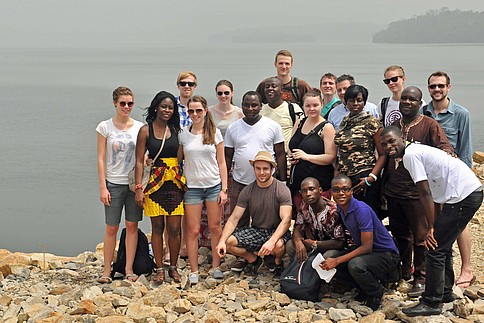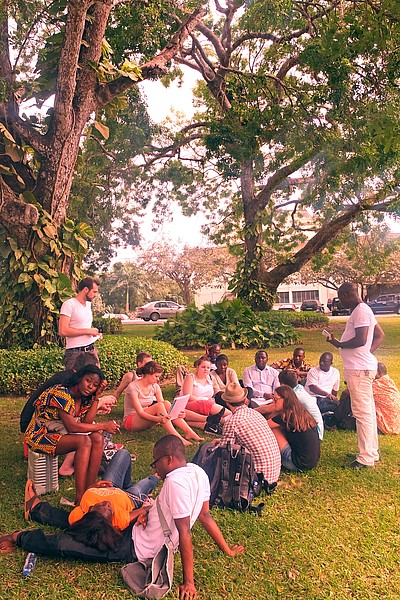Ghana and North Rhine-Westphalia in exchange
DORTMUND/ACCRA. Radio journalists from two continents are working together on environmental and energy topics, with insights into the culture and life of the partner country included.

Exchange. A term that encompasses at least the following: a group of open-minded individuals and diverse perspectives. And that was precisely the foundation for the "MediaLab CampusXchange" project, organized by GIZ (German Society for International Cooperation), the state of North Rhine-Westphalia, and the Technical University of Dortmund. Eight German radio journalists from North Rhine-Westphalia and eight radio journalists from various Ghanaian campus radio stations came together to bring this term—exchange—to life.
Winneba: The binational exchange group collaboratively produced five radio programs. For ten days, the Ghanaian partners visited Dortmund to gain insight into the German media system, while the German participants packed their bags shortly thereafter to travel to Ghana for ten days. The goal of the project participants was to learn from each other and enhance their own journalistic skills. The result of the program: Five radio live shows, one of which was broadcast by Dortmund's campus radio station eldoradio* and four by Ghanaian campus radio stations. The shows included various radio reports, features, and interviews, produced by German-Ghanaian pairs.

The contributions all focused on environmental topics. The young reporters described, for example, the long journey of a television set that starts in a German living room and ends up in an African second-hand store. They addressed the topic of consumption: such as the consumption of energy—and they compared how Ghanaians and Germans manage the resource of water. Additionally, the journalists asked: How do the governments of the two countries handle waste recycling? What efforts are being made in both Germany and Ghana to produce environmentally friendly energy?
However, the primary goal of "MediaLab CampusXchange" was not just to produce radio contributions and shows. Above all, it was about the exchange of experiences. During the visit to Germany, the participants attended training sessions like "train-the-trainer" courses to prepare for what awaited them in Ghana. There, they planned and conducted workshops together, for example on topics like audio editing and radio formats. During these workshops, they worked together to support and further educate the Ghanaian students, all of whom are involved in campus radio, in journalistic theory and practice.
German Snow and Ghanaian Heat
The exchange program was marked by cultural exchange and offered the participants the opportunity to gain insight into a previously completely unfamiliar country. During their visit to Germany, the Ghanaians, for example, had the chance to visit the NRW state parliament, climb the steps of Cologne Cathedral, and attend a classic Dortmund home game—because Dortmund without BVB is like the Ruhr area without currywurst. While many of the Ghanaian partners saw their first snowflakes in Germany and still couldn’t quite get used to the frosty temperatures of the German winter, the German radio makers were, in turn, confronted with the scorching West African heat in Ghana.
Accra, Winneba, Cape Coast, Kumasi—all these cities were on the journalists' route and left a lasting impression. Of course, the trip to Ghana was not just about the country’s tourist attractions. Visits to Ghana’s largest landfill, the Akosombo Dam, where most of Ghana’s energy is produced, and the impacts of illegal sand mining—all these aspects made the group more aware of the problems and challenges Ghana faces.
Making radio together, advancing training together, discovering new perspectives together—"MediaLab CampusXchange" was an exceptional project that brought young journalists from two countries together. An exceptional project that proved radio definitely has the potential to unite.